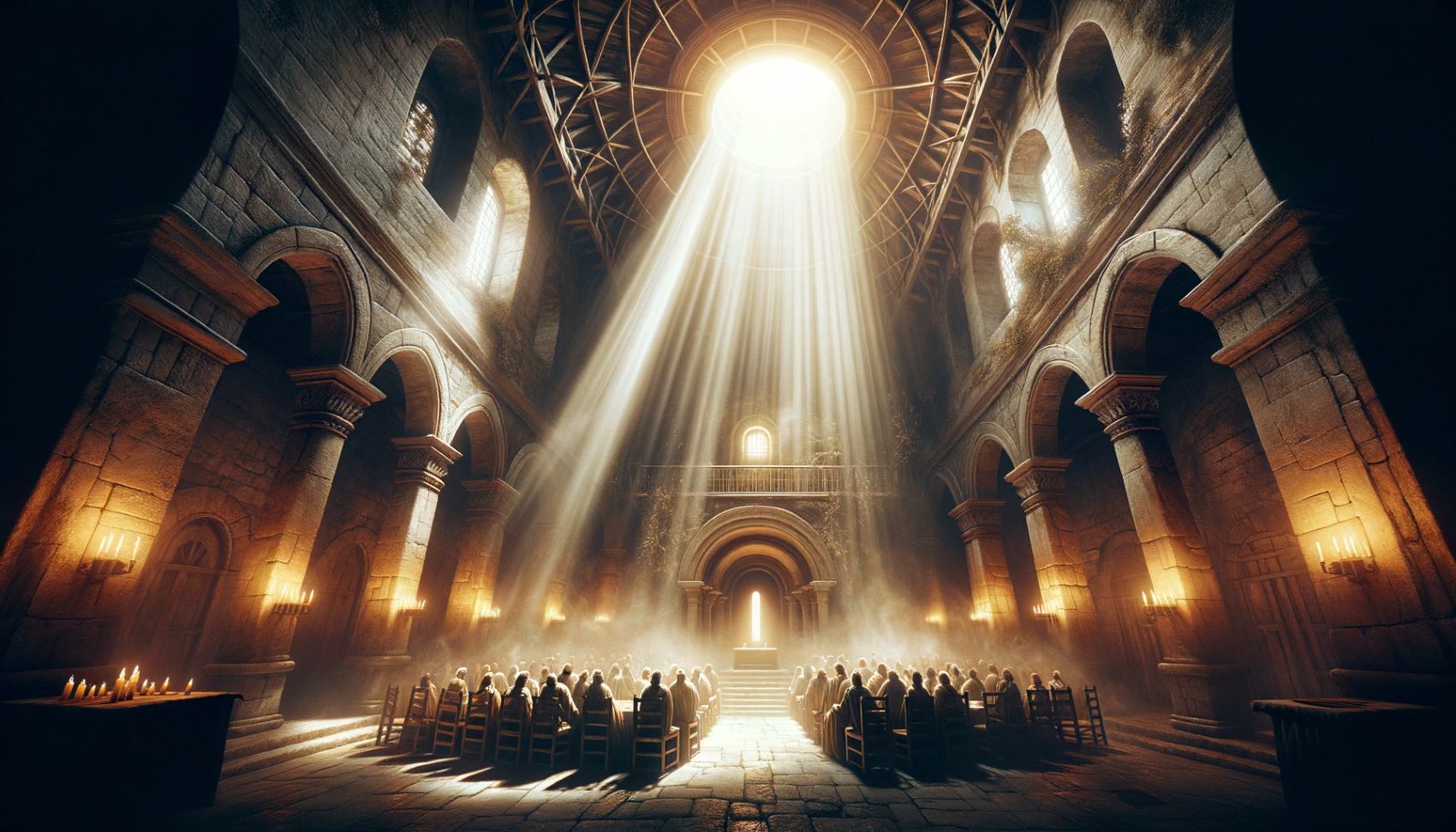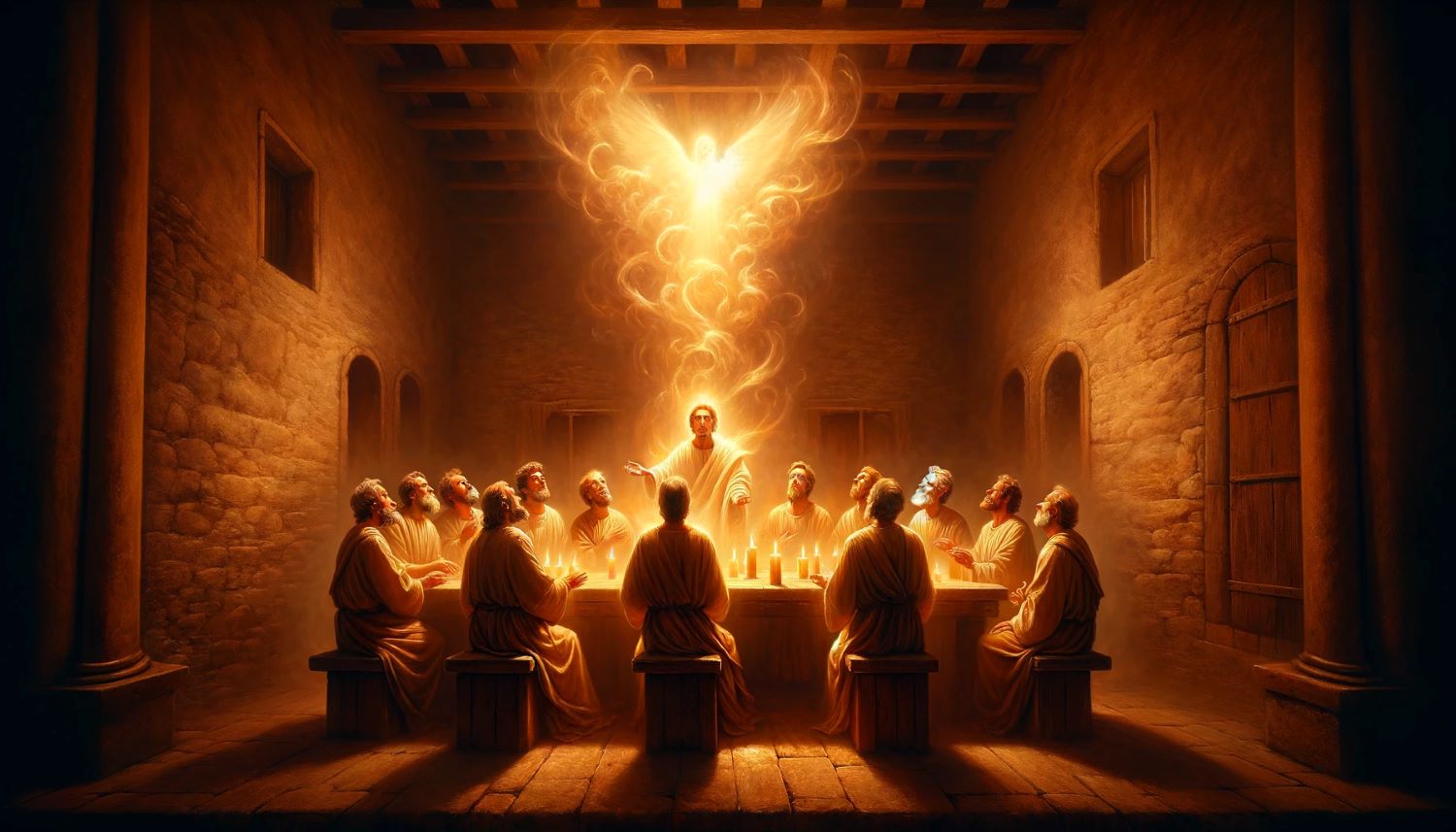Home>Theology and Spirituality>How Was John The Baptist Filled With The Holy Spirit


Theology and Spirituality
How Was John The Baptist Filled With The Holy Spirit
Published: February 24, 2024
Peter Smith, Editorial Director at Christian.net, combines deep insights into faith, politics, and culture to lead content creation that resonates widely. Awarded for his contributions to religious discourse, he previously headed a major organization for religious communicators, enhancing dialogue on faith's societal impacts.
Discover how John the Baptist was filled with the Holy Spirit and explore the theological significance of this spiritual experience. Gain insights into theology and spirituality.
(Many of the links in this article redirect to a specific reviewed product. Your purchase of these products through affiliate links helps to generate commission for Christian.net, at no extra cost. Learn more)
Table of Contents
Introduction
The story of John the Baptist is a compelling narrative deeply rooted in the Christian faith. John, the son of Zechariah and Elizabeth, played a pivotal role in preparing the way for the ministry of Jesus Christ. His life, marked by divine calling and spiritual significance, serves as an inspiring example of faith and devotion.
John's birth was miraculous, as his parents were advanced in years and had been unable to conceive. However, an angel appeared to Zechariah, foretelling the birth of a son who would be filled with the Holy Spirit even from his mother's womb. This divine intervention set the stage for John's extraordinary destiny and purpose.
As we delve into the life of John the Baptist, we will explore the profound impact of his ministry in the wilderness, where he fearlessly proclaimed a message of repentance and prepared the hearts of many for the coming of the Messiah. Furthermore, we will witness the powerful encounter between John and Jesus at the moment of Jesus' baptism, a transformative event that solidified John's divine calling and illuminated the significance of Christ's mission.
Throughout his ministry, John fearlessly confronted religious leaders and exhorted the people to turn from their sinful ways, emphasizing the imminent arrival of the Kingdom of God. His unwavering commitment to truth and righteousness serves as a timeless example of moral courage and spiritual fortitude.
As we journey through the life of John the Baptist, we will witness the profound impact of his testimony about Jesus, which ultimately led many to recognize and follow the Son of God. Additionally, we will reflect on the challenges and hardships that John faced, including his imprisonment and eventual martyrdom, underscoring the cost of unwavering faith and dedication to God's will.
The life of John the Baptist is a testament to the transformative power of the Holy Spirit and the unwavering commitment to fulfilling God's purpose. Through his story, we are reminded of the profound impact of obedience, faith, and humility in the divine plan of redemption. Join us as we embark on a journey through the remarkable life of John the Baptist, exploring the depths of his faith and the enduring legacy of his ministry.
The Birth of John the Baptist
The birth of John the Baptist is a testament to the miraculous workings of the divine. Zechariah, a priest, and his wife Elizabeth, both righteous before God, were childless and advanced in years. Despite their fervent prayers for a child, Elizabeth remained barren. However, their lives were about to be profoundly touched by the hand of God.
One day, as Zechariah was performing his priestly duties in the temple, an angel of the Lord appeared to him, standing at the right side of the altar of incense. Overwhelmed by the sight, Zechariah was gripped with fear. The angel reassured him, saying, "Do not be afraid, Zechariah; your prayer has been heard. Your wife Elizabeth will bear you a son, and you are to call him John. He will be a joy and delight to you, and many will rejoice because of his birth, for he will be great in the sight of the Lord."
The angel's proclamation did not end there. He revealed that John would be filled with the Holy Spirit even from birth, a divine anointing that would set him apart for a sacred purpose. Furthermore, the angel declared that John would bring back many of the people of Israel to the Lord their God, preparing the way for the coming of the Messiah.
Zechariah, astounded by this extraordinary message, questioned the angel, expressing his disbelief due to his and Elizabeth's advanced age. In response, the angel identified himself as Gabriel, who stands in the presence of God, and announced that Zechariah would be unable to speak until the fulfillment of these events.
True to the angel's words, Elizabeth conceived and bore a son, as divinely ordained. When the time came for the child to be named, Zechariah, still unable to speak, wrote on a tablet, "His name is John." Immediately, his mouth was opened, and his tongue set free, and he began to speak, praising God.
The birth of John the Baptist was a miraculous fulfillment of God's promise, signaling the dawn of a new era in the divine plan of redemption. This extraordinary event set the stage for the remarkable life and ministry of John, who would go on to play a pivotal role in preparing the hearts of many for the coming of Jesus Christ, the long-awaited Messiah.
The birth of John the Baptist stands as a testament to the faithfulness of God in fulfilling His promises and the profound impact of individuals who are set apart for divine purposes. It serves as a powerful reminder that nothing is impossible with God and that His plans unfold in ways that surpass human understanding.
John's Ministry in the Wilderness
Following his miraculous birth and the divine prophecy surrounding his life, John the Baptist embarked on a profound and transformative ministry in the wilderness. The wilderness, a place of solitude and spiritual reflection, became the backdrop for John's powerful proclamation of repentance and preparation for the coming of the Messiah.
In the wilderness, John lived a life of simplicity and austerity, embodying the prophetic tradition of old. His attire, woven from camel's hair, and his diet of locusts and wild honey reflected his detachment from worldly comforts and his unwavering commitment to his divine calling. This intentional lifestyle served as a powerful symbol of his message, emphasizing the need for spiritual purification and a return to the heart of true devotion.
Amidst the rugged terrain and barren landscapes, John fearlessly proclaimed a message of repentance, calling the people to turn away from their sinful ways and prepare their hearts for the imminent arrival of the Kingdom of God. Multitudes from Jerusalem, Judea, and the region around the Jordan flocked to the wilderness to hear John's impassioned exhortations, drawn by the authenticity and urgency of his message.
John's ministry in the wilderness was characterized by a bold and uncompromising call to righteousness. He fearlessly confronted religious leaders and challenged the prevailing moral complacency, urging the people to bear fruits worthy of repentance. His words resonated with a prophetic fervor, piercing the hearts of his listeners and igniting a fervent desire for spiritual renewal.
Moreover, John administered the symbolic act of baptism, immersing individuals in the waters of the Jordan River as a tangible expression of their repentance and commitment to a transformed life. This ritual of baptism served as a powerful symbol of cleansing and renewal, signifying the inner transformation that John fervently preached.
The wilderness became a sacred space where the hearts of many were stirred, and the seeds of spiritual awakening were sown. John's ministry, marked by unwavering conviction and spiritual authority, prepared the way for the imminent arrival of Jesus Christ, the long-awaited Messiah.
In the wilderness, John the Baptist emerged as a prophetic voice, heralding a message of hope and redemption. His ministry transcended the physical landscape, resonating with timeless significance and eternal truth. The wilderness, once a place of desolation, became the fertile ground for the seeds of spiritual revival, sowing the foundation for the transformative impact of Jesus' ministry.
John's ministry in the wilderness stands as a testament to the power of prophetic proclamation and the enduring impact of a life wholly surrendered to God's purpose. It serves as a timeless example of unwavering faith and uncompromising dedication to the divine call, inspiring generations to heed the call to repentance and prepare their hearts for the coming of the Lord.
The Baptism of Jesus
The baptism of Jesus by John the Baptist stands as a profound and transformative moment in the narrative of Christ's earthly ministry. As Jesus approached the Jordan River, where John was baptizing multitudes as a symbol of repentance, John recognized the divine significance of Jesus' arrival. Despite feeling unworthy to baptize the Son of God, Jesus insisted, affirming the fulfillment of all righteousness through this act.
As Jesus emerged from the waters of the Jordan, the heavens were opened, and the Spirit of God descended like a dove, alighting upon Him. This divine manifestation signified the anointing of Jesus by the Holy Spirit, marking the commencement of His public ministry. Additionally, a voice from heaven resounded, declaring, "This is my beloved Son, in whom I am well pleased." This proclamation affirmed Jesus' divine identity and the Father's approval of His earthly mission.
The baptism of Jesus holds profound theological significance, transcending the symbolic act of immersion in water. It symbolizes Jesus' identification with humanity, as He willingly partook in a ritual of repentance despite His sinless nature. Furthermore, it serves as a powerful demonstration of Jesus' solidarity with humanity, foreshadowing His redemptive work on the cross.
Moreover, Jesus' baptism inaugurated a new era in the divine plan of salvation. It marked the beginning of His public ministry, characterized by teachings, miracles, and the demonstration of God's kingdom. The anointing of the Holy Spirit empowered Jesus for the fulfillment of His mission, equipping Him to preach the good news, heal the sick, and bring hope to the brokenhearted.
The baptism of Jesus also serves as a model for believers, emphasizing the importance of identifying with Christ and embracing the transformative work of the Holy Spirit. Through baptism, individuals publicly declare their faith in Jesus Christ, symbolizing their participation in His death and resurrection and their commitment to a life of discipleship.
In essence, the baptism of Jesus by John the Baptist serves as a pivotal moment in the unfolding drama of redemption. It illuminates the divine unity within the Trinity, affirms Jesus' identity as the Son of God, and inaugurates His earthly ministry. This sacred event embodies the profound intersection of heaven and earth, marking the beginning of a journey that would ultimately lead to the cross and the triumph of resurrection.
John's Testimony about Jesus
John the Baptist's testimony about Jesus stands as a profound declaration of the Messiah's divine identity and redemptive mission. As John faithfully carried out his ministry in the wilderness, he bore witness to the arrival of Jesus Christ, the long-awaited Savior foretold by the prophets of old.
In the Gospel of John, the Baptist's testimony resounds with unwavering conviction and profound insight into the nature of Jesus' mission. He boldly proclaimed, "Behold, the Lamb of God, who takes away the sin of the world!" This powerful declaration encapsulates the essence of Jesus' redemptive purpose, portraying Him as the sacrificial Lamb whose atoning work would bring salvation to humanity.
Moreover, John testified to the preeminence of Jesus, acknowledging that He existed before him, despite being born after him. This acknowledgment underscores the eternal nature of Christ, transcending temporal constraints and affirming His divine origin. John's testimony serves as a poignant reminder of Jesus' preeminence and eternal significance in the grand narrative of redemption.
Furthermore, John bore witness to the transformative impact of Jesus' ministry, emphasizing His role as the One who baptizes with the Holy Spirit. This profound statement illuminates Jesus' capacity to impart the transformative power of the Holy Spirit, ushering believers into a new dimension of spiritual life and empowerment.
John's testimony about Jesus reverberates with prophetic authority, illuminating the profound impact of Christ's redemptive work. His unwavering proclamation paved the way for many to recognize and follow Jesus, setting in motion a transformative movement that would ultimately reshape the course of human history.
In essence, John the Baptist's testimony about Jesus serves as a timeless testament to the profound impact of Christ's mission on humanity. His bold declarations and unwavering conviction underscore the transformative power of Jesus' redemptive work, inviting all to behold the Lamb of God who brings salvation and eternal life to all who believe.
John's Imprisonment and Death
Following his unwavering proclamation of truth and righteousness, John the Baptist faced the harrowing ordeal of imprisonment. His fearless denunciation of King Herod Antipas' unlawful marriage to Herodias, the wife of his brother, incurred the wrath of the ruling authorities. Despite the inherent risks, John remained resolute in his commitment to uphold God's moral standards, even in the face of impending persecution.
Imprisoned in the fortress of Machaerus, John endured the confines of captivity with unwavering faith and unyielding conviction. His imprisonment, however, did not diminish the fervor of his spirit or the clarity of his message. Even in the darkness of captivity, John continued to exhort and inspire, his voice echoing with the timeless truths of repentance and the imminent arrival of the Kingdom of God.
The circumstances surrounding John's imprisonment took a tragic turn with the infamous banquet held by Herod Antipas. During the lavish event, Herodias' daughter, Salome, danced before the king, captivating him with her performance. In a moment of ill-fated impulse, Herod Antipas made a rash vow, promising to grant the young dancer anything she desired, up to half his kingdom. Prompted by her mother, Salome requested the head of John the Baptist on a platter.
Despite his personal fondness for John and the weight of internal conflict, Herod Antipas, bound by his oath and the fear of losing face before his guests, ordered the execution of John. The prophet of the wilderness, the voice crying out in the desert, met a tragic end at the hands of worldly power and moral compromise.
The death of John the Baptist, a martyr for truth and righteousness, reverberated with profound significance. His unwavering commitment to God's truth and his willingness to endure persecution and death for the sake of righteousness left an indelible mark on the annals of Christian history. His legacy, marked by courage and unwavering faith, continues to inspire generations to stand firm in the face of adversity and to uphold the timeless principles of God's kingdom, regardless of the cost.
The imprisonment and martyrdom of John the Baptist serve as a poignant reminder of the enduring struggle between the kingdoms of this world and the kingdom of God. His steadfast commitment to truth and righteousness, even unto death, embodies the sacrificial nature of discipleship and the eternal significance of bearing witness to the light, regardless of the prevailing darkness.
Conclusion
The life and ministry of John the Baptist stand as a testament to the transformative power of faith, obedience, and unwavering commitment to God's divine purpose. From his miraculous birth, filled with the Holy Spirit from his mother's womb, to his fearless proclamation of repentance in the wilderness, John exemplified the essence of prophetic calling and spiritual fortitude. His encounter with Jesus at the moment of baptism marked a pivotal moment in the narrative of redemption, illuminating the divine unity within the Trinity and affirming Jesus' identity as the beloved Son of God.
John's testimony about Jesus resounded with prophetic authority, heralding the arrival of the long-awaited Messiah and inviting all to behold the Lamb of God who takes away the sin of the world. His imprisonment and eventual martyrdom underscored the cost of unwavering faith and moral courage, serving as a timeless example of the enduring struggle between the kingdoms of this world and the kingdom of God.
The legacy of John the Baptist continues to inspire and challenge believers across generations. His life reflects the profound impact of individuals wholly surrendered to God's purpose, transcending personal comfort and worldly acclaim in pursuit of divine truth. John's unwavering commitment to righteousness and his willingness to endure persecution and death for the sake of God's kingdom serve as a poignant reminder of the sacrificial nature of discipleship and the eternal significance of bearing witness to the light, regardless of the prevailing darkness.
As we reflect on the remarkable life of John the Baptist, we are reminded of the enduring relevance of his message of repentance, spiritual renewal, and the imminent arrival of the Kingdom of God. His ministry in the wilderness, his testimony about Jesus, and his ultimate sacrifice stand as timeless beacons of hope and courage, inviting all to embrace the transformative power of the Holy Spirit and to stand firm in the face of adversity.
In essence, the life of John the Baptist serves as a compelling narrative of divine calling, unwavering faith, and the enduring legacy of prophetic proclamation. His story transcends the boundaries of time and culture, resonating with profound significance and eternal truth. Through his life and ministry, John beckons us to embrace the transformative work of the Holy Spirit, to boldly proclaim the truth, and to stand unwavering in the face of opposition, knowing that the kingdom of God prevails now and for all eternity.














